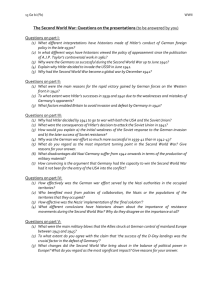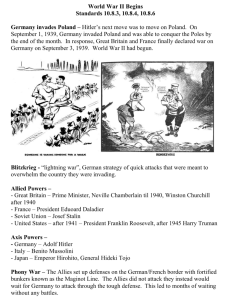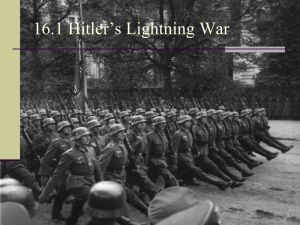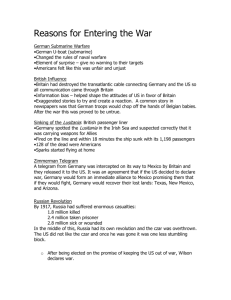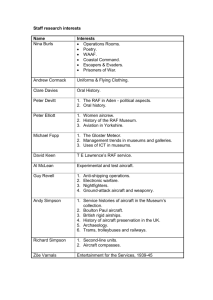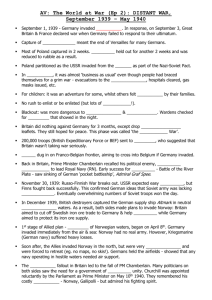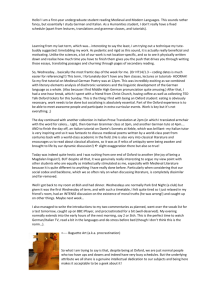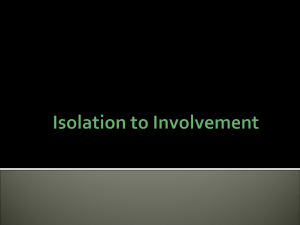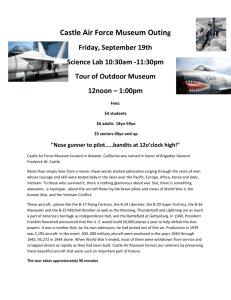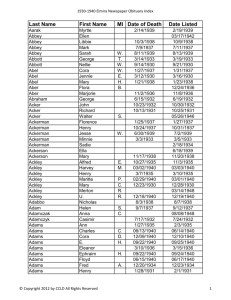The modern world is still living with the consequences of World War
advertisement
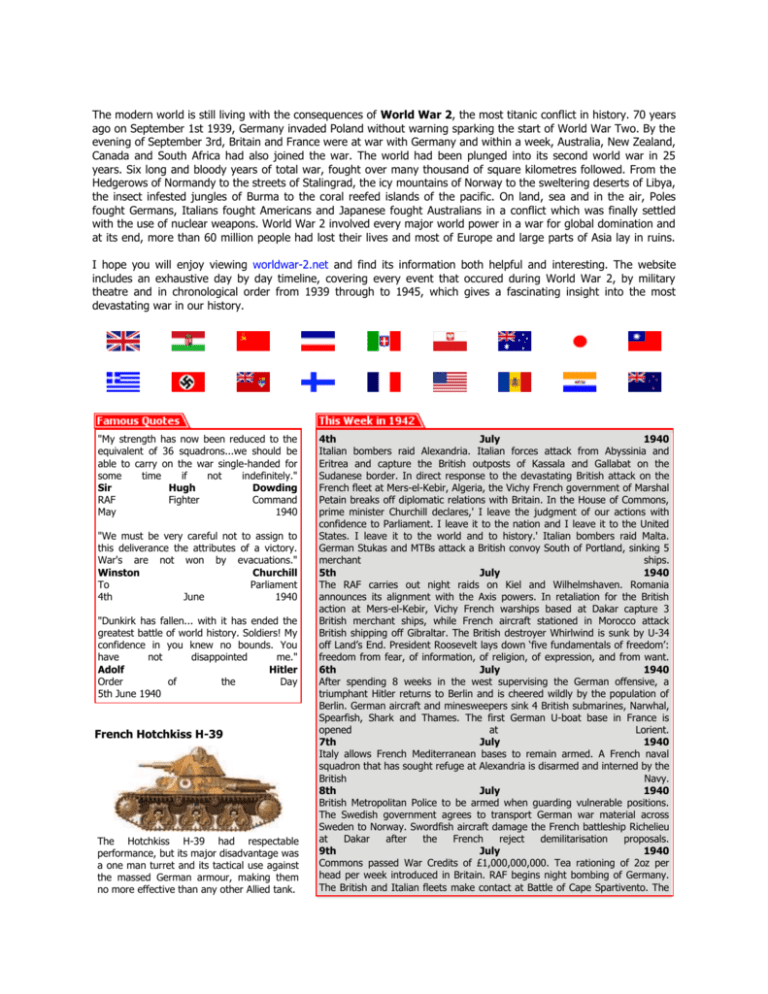
The modern world is still living with the consequences of World War 2, the most titanic conflict in history. 70 years ago on September 1st 1939, Germany invaded Poland without warning sparking the start of World War Two. By the evening of September 3rd, Britain and France were at war with Germany and within a week, Australia, New Zealand, Canada and South Africa had also joined the war. The world had been plunged into its second world war in 25 years. Six long and bloody years of total war, fought over many thousand of square kilometres followed. From the Hedgerows of Normandy to the streets of Stalingrad, the icy mountains of Norway to the sweltering deserts of Libya, the insect infested jungles of Burma to the coral reefed islands of the pacific. On land, sea and in the air, Poles fought Germans, Italians fought Americans and Japanese fought Australians in a conflict which was finally settled with the use of nuclear weapons. World War 2 involved every major world power in a war for global domination and at its end, more than 60 million people had lost their lives and most of Europe and large parts of Asia lay in ruins. I hope you will enjoy viewing worldwar-2.net and find its information both helpful and interesting. The website includes an exhaustive day by day timeline, covering every event that occured during World War 2, by military theatre and in chronological order from 1939 through to 1945, which gives a fascinating insight into the most devastating war in our history. "My strength has now been reduced to the equivalent of 36 squadrons...we should be able to carry on the war single-handed for some time if not indefinitely." Sir Hugh Dowding RAF Fighter Command May 1940 "We must be very careful not to assign to this deliverance the attributes of a victory. War's are not won by evacuations." Winston Churchill To Parliament 4th June 1940 "Dunkirk has fallen... with it has ended the greatest battle of world history. Soldiers! My confidence in you knew no bounds. You have not disappointed me." Adolf Hitler Order of the Day 5th June 1940 French Hotchkiss H-39 The Hotchkiss H-39 had respectable performance, but its major disadvantage was a one man turret and its tactical use against the massed German armour, making them no more effective than any other Allied tank. 4th July 1940 Italian bombers raid Alexandria. Italian forces attack from Abyssinia and Eritrea and capture the British outposts of Kassala and Gallabat on the Sudanese border. In direct response to the devastating British attack on the French fleet at Mers-el-Kebir, Algeria, the Vichy French government of Marshal Petain breaks off diplomatic relations with Britain. In the House of Commons, prime minister Churchill declares,' I leave the judgment of our actions with confidence to Parliament. I leave it to the nation and I leave it to the United States. I leave it to the world and to history.' Italian bombers raid Malta. German Stukas and MTBs attack a British convoy South of Portland, sinking 5 merchant ships. 5th July 1940 The RAF carries out night raids on Kiel and Wilhelmshaven. Romania announces its alignment with the Axis powers. In retaliation for the British action at Mers-el-Kebir, Vichy French warships based at Dakar capture 3 British merchant ships, while French aircraft stationed in Morocco attack British shipping off Gibraltar. The British destroyer Whirlwind is sunk by U-34 off Land’s End. President Roosevelt lays down ‘five fundamentals of freedom’: freedom from fear, of information, of religion, of expression, and from want. 6th July 1940 After spending 8 weeks in the west supervising the German offensive, a triumphant Hitler returns to Berlin and is cheered wildly by the population of Berlin. German aircraft and minesweepers sink 4 British submarines, Narwhal, Spearfish, Shark and Thames. The first German U-boat base in France is opened at Lorient. 7th July 1940 Italy allows French Mediterranean bases to remain armed. A French naval squadron that has sought refuge at Alexandria is disarmed and interned by the British Navy. 8th July 1940 British Metropolitan Police to be armed when guarding vulnerable positions. The Swedish government agrees to transport German war material across Sweden to Norway. Swordfish aircraft damage the French battleship Richelieu at Dakar after the French reject demilitarisation proposals. 9th July 1940 Commons passed War Credits of £1,000,000,000. Tea rationing of 2oz per head per week introduced in Britain. RAF begins night bombing of Germany. The British and Italian fleets make contact at Battle of Cape Spartivento. The Austrailia Casualties (1939 - 1945): Soldiers (Allied) - 31,200 Killed British force includes 1 Aircraft Carrier and 3 Battleships, while the Italian squadron under Admiral Campioni consists of 2 Battleships, 6 heavy and 12 light cruisers. The Italians brake off contact after their flag ship Giulio Cesare is hit and damaged, although they still claim a naval victory. The British submarine Salmon is lost south-west of Stavanger, Norway. The German raider Komet leaves Bergen in Norway for operations in the Pacific via the Northwest Passage in the Arctic Ocean assisted by Russian icebreakers. 10th July 1940 Birthday Honours list includes only service recipients. British Union Party (Fascists) banned. Preliminary phase of Battle of Britain begins with German air attacks on Channel convoys with the aim of tempting the RAF in to battle. The Luftwaffe launches its first large scale attack on Britain as 70 aircraft attack the dock facilities at Swansea and the Royal Ordnance Factory at Pembrey in Wales.
